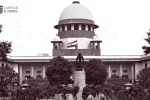Supreme Court Sets Guidelines For Reforms, Transparent And Objective Process Of Senior Advocate Designation

On 12 May 2023, the Supreme Court of India, led by Justice Sanjay Kishan Kaul, delivered a landmark judgment on May 12, 2023, regarding the designation of Senior Advocates. The judgment aims to introduce reforms to the existing system, ensuring a transparent and objective process in recognizing the distinction of Senior Advocates in the legal profession.
The historical and legal background of the designation of Senior Advocates was extensively discussed in the judgment. The court traced the origins of this distinguished class back to the United Kingdom, with the practice of Serjeants-at-Law in the 13th century and the later introduction of King’s/Queen’s Counsel. The designation of Senior Advocates in India is seen as a mark of excellence and professional eminence, with advocates who have made significant contributions to the development of the legal profession.
The court highlighted that the criteria for the designation of Senior Advocates have evolved over the years. Parameters such as ability, standing at the Bar, special knowledge, and experience in law have been considered. The higher judiciary in India has the discretion to designate Senior Advocates based on these criteria.
The judgment extensively discussed the 2017 judgment and guidelines that aimed to address the flaws in the existing system. The introduction of a Permanent Committee and an objective assessment process based on a point-based format were among the key reforms proposed. The committee, headed by the Chief Justice and comprising two senior-most judges and representatives from the bar, would assess applications and evaluate factors such as the number of years of practice, legal formulations advanced, publications, and personality suitability through interviews.
The court addressed several issues in the judgment, including the use of secret ballot in the designation process. It emphasized that secret ballots should be the exception rather than the norm, and their reasons should be recorded. The court also discussed the challenge of determining cut-off marks in advance, opting for flexibility in deciding the number of successful applicants based on the evaluation and interview process.
Significant changes were made regarding the allocation of points for publications, with a reduction from 15 to 5 points. The inclusion of teaching assignments and guest courses delivered at law schools was deemed important in assessing an advocate’s ability to contribute to the development of the law.
The court acknowledged the need for specialization and diversity in the designation process, recognizing the expertise of advocates in specific fields of law and encouraging representation from diverse backgrounds, including gender and first-generation lawyers.
Modifications to the guidelines:
- Voting by secret ballot should be an exception, and reasons for its use should be recorded.
- Cut-off marks for designation should not be published in advance.
- Points assigned for publications should be reduced to 5 and expanded to include teaching assignments or guest courses delivered by advocates.
- Role played by advocates in reported judgments should be considered, along with the quality of synopses filed in court.
- Specialized advocates should receive concessions regarding the number of appearances required for designation.
- Consideration should be given to diversity, including gender and first-generation lawyers.
- The interview process should be retained for a more holistic assessment.
- Designation process should be carried out at least once a year to avoid accumulation of applications.
- Younger advocates can apply for designation but must demonstrate exceptional abilities.
- The power of suo motu designation by the Full Court remains intact.
The importance of personal interviews in evaluating candidates was emphasized, with the court highlighting the need for a more personal and in-depth examination. The streamlining of the interview process was also discussed to ensure efficiency.
The judgment clarified that the reforms and guidelines provided were meant to fine-tune the existing process rather than review or expand the scope of the 2017 judgment. The court also addressed pending applications, stating that they should be considered under the new guidelines, giving candidates the opportunity to update or replace their applications.
The objective of the designation process, as emphasized in the judgment, is to provide better assistance to litigants and the courts. The court highlighted the continuous improvement of the process as an ongoing endeavor.
The Supreme Court’s judgment on the designation of Senior Advocates sets forth comprehensive guidelines for a transparent and objective process. The reforms aim to recognize excellence and professional eminence while encouraging specialization, diversity, and the overall improvement of legal services. The judgment is expected to bring significant positive changes to the legal profession in India
DATE OF DECISION: May 12, 2023
INDIRA JAISING vs SUPREME COURT OF INDIA, THROUGH SECRETARY GENERAL






